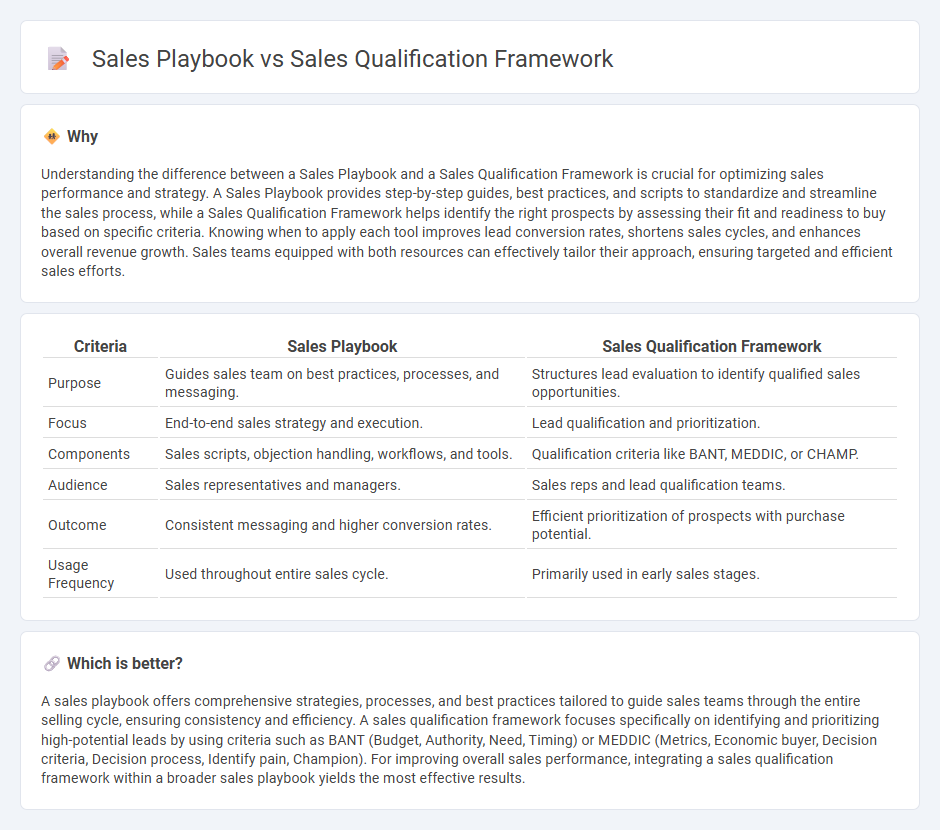
Sales playbooks provide structured strategies and best practices to guide sales teams through each stage of the buying process, focusing on consistent communication and effective tactics. Sales qualification frameworks prioritize identifying key buyer needs, budget constraints, and decision-making authority to determine the readiness of prospects to advance. Explore detailed comparisons to optimize your sales approach and close deals more efficiently.
Why it is important
Understanding the difference between a Sales Playbook and a Sales Qualification Framework is crucial for optimizing sales performance and strategy. A Sales Playbook provides step-by-step guides, best practices, and scripts to standardize and streamline the sales process, while a Sales Qualification Framework helps identify the right prospects by assessing their fit and readiness to buy based on specific criteria. Knowing when to apply each tool improves lead conversion rates, shortens sales cycles, and enhances overall revenue growth. Sales teams equipped with both resources can effectively tailor their approach, ensuring targeted and efficient sales efforts.
Comparison Table
| Criteria | Sales Playbook | Sales Qualification Framework |
|---|---|---|
| Purpose | Guides sales team on best practices, processes, and messaging. | Structures lead evaluation to identify qualified sales opportunities. |
| Focus | End-to-end sales strategy and execution. | Lead qualification and prioritization. |
| Components | Sales scripts, objection handling, workflows, and tools. | Qualification criteria like BANT, MEDDIC, or CHAMP. |
| Audience | Sales representatives and managers. | Sales reps and lead qualification teams. |
| Outcome | Consistent messaging and higher conversion rates. | Efficient prioritization of prospects with purchase potential. |
| Usage Frequency | Used throughout entire sales cycle. | Primarily used in early sales stages. |
Which is better?
A sales playbook offers comprehensive strategies, processes, and best practices tailored to guide sales teams through the entire selling cycle, ensuring consistency and efficiency. A sales qualification framework focuses specifically on identifying and prioritizing high-potential leads by using criteria such as BANT (Budget, Authority, Need, Timing) or MEDDIC (Metrics, Economic buyer, Decision criteria, Decision process, Identify pain, Champion). For improving overall sales performance, integrating a sales qualification framework within a broader sales playbook yields the most effective results.
Connection
A Sales Playbook provides structured guidelines and best practices for the entire sales process, helping reps navigate each stage effectively. The Sales Qualification Framework, integrated within the playbook, assists in identifying and prioritizing high-potential leads based on criteria like budget, authority, need, and timeline (BANT). Together, they streamline sales efforts by ensuring consistent lead evaluation and tailored engagement strategies, driving higher conversion rates.
Key Terms
Sales qualification framework:
Sales qualification frameworks provide structured criteria to evaluate prospects' readiness and fit, enhancing pipeline quality and sales efficiency. These frameworks utilize metrics such as budget, authority, need, and timeline (BANT) to prioritize leads and tailor sales strategies. Discover how implementing a robust sales qualification framework can accelerate deal closure rates and optimize resource allocation.
BANT (Budget, Authority, Need, Timeline)
The sales qualification framework, particularly BANT (Budget, Authority, Need, Timeline), is designed to assess the viability of a lead by evaluating their financial capacity, decision-making power, specific business needs, and purchasing timeline. In contrast, a sales playbook encompasses a broader strategic guide that includes BANT for qualification but also outlines sales methodologies, messaging, objection handling, and process workflows to drive conversions. Explore how integrating a BANT-focused qualification into your sales playbook can optimize lead management and accelerate deal closure.
Lead Scoring
Sales qualification frameworks prioritize lead scoring systems to assess potential buyers based on criteria like budget, need, timeline, and authority, ensuring resources target high-conversion prospects. Sales playbooks integrate lead scoring within broader strategies, providing scripted approaches and tailored messaging aligned with the scoring outcomes. Explore how refining lead scoring enhances qualification accuracy and sales effectiveness.
Source and External Links
The 5 best Sales Qualification Frameworks - ContactBase - Sales qualification frameworks are systematic tools with fixed criteria, such as SCOTSMAN (which assesses solution value, competition, uniqueness, timeline, size, money, authority, and need) and FAINT for early-stage concepts, used to evaluate if a product or service fits a customer's needs in the sales process.
How to choose the right Sales Qualification Framework - Demodesk - A sales qualification framework is a structured approach to determine if a lead is likely to convert by evaluating budget, authority, need, and timing (BANT) among other criteria, helping sales teams prioritize efforts and tailor strategies effectively.
The Complete Guide to Sales Qualification - Weflow - Common sales qualification frameworks include BANT (Budget, Authority, Need, Timeline) and SPICED (Situation, Pain, Impact, Critical Event, Decision), which provide consistent standards for qualifying leads to keep pipelines clean and improve deal closing rates.
 dowidth.com
dowidth.com